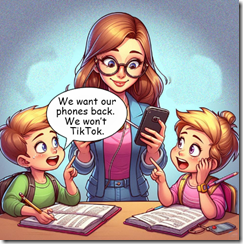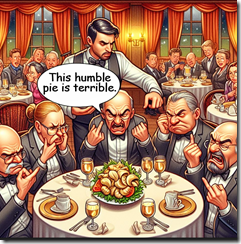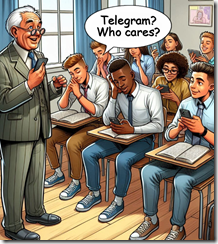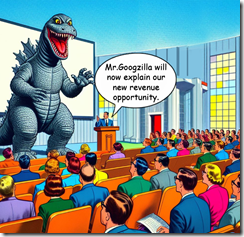Large Dictators. Name the Largest
June 6, 2024
 This essay is the work of a dinobaby. Unlike some folks, no smart software improved my native ineptness.
This essay is the work of a dinobaby. Unlike some folks, no smart software improved my native ineptness.
I read “Social Media Bosses Are the Largest Dictators, Says Nobel Peace Prize Winner.” I immediately thought of “fat” dictators; for example, Benito Mussolini, but I may have him mixed up with Charles Laughton in “Mutiny on the Bounty.”
A mother is trying to implement the “keep your kids off social media” recommendation. Thanks, MSFT Copilot. Good enough.
I think the idea intended is something along the lines of “unregulated companies and their CEOs have more money and power than some countries. These CEOs act like dictators on a par with Julius Caesar. Brutus and friends took out Julius, but the heads of technopolies are indifferent to laws, social norms, and the limp limbs of ethical behavior.”
That’s a lot of words. Ergo: Largest dictators is close enough for horseshoes. It is 2024, and no one wants old-fashioned ideas like appropriate business activities to get in the way of making money and selling online advertising.
The write up shares the quaint ideas of a Noble Peace Prize winner. Here are the main points about social media and technology by someone who is interested in peace:
- Tech bros are dictators with considerable power over information and ideas
- Tech bros manipulate culture, language, and behavior
- The companies these dictators runs “change the way we feel” and “change the way we see the world and change the way we act”
I found this statement from the article suggestive:
“In the Philippines, it was rich versus poor. In the United States, it’s race,” she said. “Black Lives Matter … was bombarded on both sides by Russian propaganda. And the goal was not to make people believe one thing. The goal was to burst this wide open to create chaos.” The way tech companies are “inciting polarization, inciting fear and anger and hatred” changes us “at a personal level, a societal level”, she said.
What’s the fix? A speech? Two actions are needed:
- Dump the protection afforded the dictators by the 1996 Communications Decency Act
- Prevent children from using social media.
Now it is time for a reality check. Changing the Communications Decency Act will take some time. Some advocates have been chasing this legal Loch Ness monster for years. The US system is sensitive to “laws” and lobbyists. Change is slow and regulations are often drafted by lobbyists. Therefore, don’t hold your breath on revising the CDA by the end of the week.
Second, go to a family-oriented restaurant in the US. How many of the children have mobile phones? Now, be a change expert, and try to get the kids at a nearby table to give you their mobile devices. Let me know how that works out, please.
Net net: The Peace Prize winner’s ideas are interesting. That’s about it. And the fat dictators? Keto diets and chemicals do the trick.
Stephen E Arnold, June 6, 2024
The Leak: One Nothing Burger, Please
June 5, 2024
 This essay is the work of a dinobaby. Unlike some folks, no smart software improved my native ineptness.
This essay is the work of a dinobaby. Unlike some folks, no smart software improved my native ineptness.
Everywhere I look I see write ups about the great Google leak. One example is the poohbah publication The Verge and its story “The Biggest Findings in the Google Search Leak.” From the git-go there is information which reveals something many people know about the Google. It does not explain what it does or its intentions. It just does stuff and then fancy dances around what the company is actually doing. How long has this been going on? Since the litigation about Google’s inspiring encounter with the Yahoo, Overture, GoTo pay-to-play advertising model. In one of my monographs about Google I created this illustration to explain how the Google technology works.
Here’s what I wrote in Google: The Calculating Predator (Infonortics, UK, 2007):
Like a skilled magician, a good stage presence and a bit of misdirection focus attention where Google wants it.
The “leak” is fodder for search engine optimization professionals who unwittingly make the case for just buying advertising. But the leak delivers one useful insight: Google does not tell what it does in plain English. Some call it prevarication; I call it part of the overall strategy of the firm. The philosophy is one manifestation of the idea that “users” don’t need to know anything. “Users” are there to allow Google to sell advertising, broker advertising, and automate advertising. Period. This is the ethos of the high school science club which knows everything. Obviously.
The cited article revealing the biggest findings offers these insights. Please, sit down. I don’t want to be responsible for causing anyone bodily harm.
First snippet:
Google spokespeople have repeatedly denied that user clicks factor into ranking websites, for example — but the leaked documents make note of several types of clicks users make and indicate they feed into ranking pages in search. Testimony from the antitrust suit by the US Department of Justice previously revealed a ranking factor called Navboost that uses searchers’ clicks to elevate content in search.
Are you still breathing. Yep, Google pays attention to clicks. Yes, that’s one of the pay-to-play requirements: Show data to advertisers and get those SEO people acting as an advertising pre-sales service. When SEO fails, buy ads. Yep, earth shattering.
An actual expert in online search examines the information from the “leak” and realizes the data for what they are: Out of context information from a mysterious source. Thanks MidJourney. Other smart services could not deliver a nothing burger. Yours is good enough.
How about this stunning insight:
Google Search representatives have said that they don’t use anything from Chrome for ranking, but the leaked documents suggest that may not be true.
Why would Google spend money to build a surveillance enabled software system? For fun? No, not for fun. Browsers funnel data back to a command-and-control center. The data are analyzed and nuggets used to generate revenue from advertising. This is a surprise. Microsoft got in trouble for browser bundling, but since the Microsoft legal dust up, regulators have taken a kinder, gentler approach to the Google.
Are there more big findings?
Yes, we now know what a digital nothing burger looks like. We already knew what falsehoods look like. SEO professionals are shocked. What’s that say for the unwitting Google pre-advertising purchase advocates?
Stephen E Arnold, June 5, 2024
Lunch at a Big Time Publisher: Humble Pie and Sour Words
June 4, 2024
 This essay is the work of a dinobaby. Unlike some folks, no smart software improved my native ineptness.
This essay is the work of a dinobaby. Unlike some folks, no smart software improved my native ineptness.
Years ago I did some work for a big time New York City publisher. The firm employed people who used words like “fungible” and “synergy” when talking with me. I took the time to read an article with this title: “So Much for Peer Review — Wiley Shuts Down 19 Science Journals and Retracts 11,000 Gobbledygook Papers.” Was this the staid, conservative, and big vocabulary?
Yep.
The essay is little more than a wrapper for a Wall Street Journal story with the title “Flood of Fake Science Forces Multiple Journal Closures Tainted by Fraud.” I quite like that title, particularly the operative word “fraud.” What in the world is going on?
The write up explains:
Wiley — a mega publisher of science articles has admitted that 19 journals are so worthless, thanks to potential fraud, that they have to close them down. And the industry is now developing AI tools to catch the AI fakes (makes you feel all warm inside?)
A group of publishing executives becomes the focal point of a Midtown lunch in an upscale restaurant. The titans of publishing are complaining about the taste of humble pie and user secret NYAC gestures to express their disapproval. Thanks, MSFT Copilot. Your security expertise may warrant a special banquet too.
The information in the cited article contains some tasty nuggets which complement humble pie in my opinion; for instance:
- The shut down of the junk food publications has required two years. If Sillycon Valley outfits can fire thousands via email or Zoom, “Why are those uptown shoes being dragged?” I asked myself.
- Other high-end publishers have been doing the same thing. Sadly there are no names.
- The bogus papers included something called a “AI gobbledygook sandwich.” Interesting. Human reviews who are experts could not recognize the vernacular of academic and research fraudsters.
- Some in Australia think that the credibility of universities might be compromised. Oh, come now. Just because the president of Stanford had to search for his future elsewhere after some intellectual fancy dancing and the head of the Harvard ethic department demonstrated allegedly sci-fi ethics in published research, what’s the problem? Don’t students just get As and Bs. Professors are engaged in research, chasing consulting gigs, and ginning up grant money. Actual research? Oh, come now.
- Academic journals are or were a $30 billion dollar industry.
Observations are warranted:
- In today’s datasphere, I am not surprised. Scams, frauds, and cheats seems to be as common as ants at a picnic. A cultural shift has occurred. Cheating has become the norm.
- Will the online databases, produced by some professional publishers and commercial database companies, be updated to remove or at least flag the baloney? Probably not. That costs money. Spending money is not a modern publishing CEO’s favorite activity. (Hence the two-year draw down of the fake information at the publishing house identified in the cited write up.)
- How many people have died or been put out of work because of specious research data? I am not holding my breath for the peer reviewed journals to provide this information.
Net net: Humiliating and a shame. Quite a cultural mismatch between what some publishers say and this alleged what the firm ordered from the deli. I thought the outfit had a knowledge-based reason to tell me that it takes the high road. It seems that on that road, there are places where a bad humble pie is served.
Stephen E Arnold, June 4, 2024
Spot a Psyop Lately?
June 3, 2024
 This essay is the work of a dinobaby. Unlike some folks, no smart software improved my native ineptness.
This essay is the work of a dinobaby. Unlike some folks, no smart software improved my native ineptness.
Psyops or psychological operations is also known as psychological warfare. It’s defines as actions used to weaken an enemy’s morale. Psyops can range from simple propaganda poster to a powerful government campaign. According to Annalee Newitz on her Hypothesis Buttondown blog, psyops are everywhere and she explains: “How To Recognize A Psyop In Three Easy Steps.”
Newitz smartly condenses the history of American psyops into a paragraph: it’s a mixture of pulp fiction tropes, advertising techniques, and pop psychology. In the twentieth century, US military harnessed these techniques to make messages to hurt, demean, and distract people. Unlike weapons, psyops can be avoided with a little bit of critical thinking.
The first step is to pay attention when people claim something is “anti-American.” The term “anti-American” can be interpreted in many ways, but it comes down to media saying one group of people (foreign, skin color, sexual orientation, etc.) is against the American way of life.
The second step is spreading lies with hints of truth. Newitz advises to read psychological warfare military manuals and uses an example of leaflets the Japanese dropped on US soldiers in the Philippines. The leaflets warned the soldiers about venomous snakes in jungles and they were signed by with “US Army.” Soldiers were told the leaflets were false, but it made them believe there were coverups:
“Psyops-level lies are designed to destabilize an enemy, to make them doubt themselves and their compatriots, and to convince them that their country’s institutions are untrustworthy. When psyops enter culture wars, you start to see lies structured like this snake “warning.” They don’t just misrepresent a specific situation; they aim to undermine an entire system of beliefs.”
The third step is the easiest to recognize and the most extreme: you can’t communicate with anyone who says you should be dead. Anyone who believes you should be dead is beyond rational thought. Her advice is to ignore it and not engage.
Another way to recognize psyops tactics is to question everything. Thinking isn’t difficult, but thinking critically takes practice.
Whitney Grace, June 3, 2024
Google: Lost in Its Own AI Maze
May 31, 2024
 This essay is the work of a dinobaby. Unlike some folks, no smart software improved my native ineptness.
This essay is the work of a dinobaby. Unlike some folks, no smart software improved my native ineptness.
One “real” news items caught my attention this morning. Let me tell you. Even with the interesting activities in the Manhattan court, these jumped at me. Let’s take a quick look and see if Googzilla (see illustration) can make a successful exit from the AI maze in which the online advertising giant finds itself.
Googzilla is lost in its own AI maze. Can it find a way out? Thanks, MSFT Copilot. Three tries and I got a lizard in a maze. Keep allocating compute cycles to security because obviously Copilot is getting fewer and fewer these days.
“Google Pins Blame on Data Voids for Bad AI Overviews, Will Rein Them In” makes it clear that Google is not blaming itself for some of the wacky outputs its centerpiece AI function has been delivering. I won’t do the guilty-34-times thing. I will just mention the non-toxic glue and pizza item. This news story reports:
Google thinks the AI Overviews for its search engine are great, and is blaming viral screenshots of bizarre results on "data voids" while claiming some of the other responses are actually fake. In a Thursday post, Google VP and Head of Google Search Liz Reid doubles down on the tech giant’s argument that AI Overviews make Google searches better overall—but also admits that there are some situations where the company "didn’t get it right."
So let’s look at that Google blog post titled “AI Overviews: About Last Week.”
How about this statement?
User feedback shows that with AI Overviews, people have higher satisfaction with their search results, and they’re asking longer, more complex questions that they know Google can now help with. They use AI Overviews as a jumping off point to visit web content, and we see that the clicks to webpages are higher quality — people are more likely to stay on that page, because we’ve done a better job of finding the right info and helpful webpages for them.
The statement strikes me as something that a character would say in an episode of the Twilight Zone, a TV series in the 50s and 60s. The TV show had a weird theme, and I thought I heard it playing when I read the official Googley blog post. Is this the Google “bullseye” method or a bullsh*t method?
The official Googley blog post notes:
This means that AI Overviews generally don’t “hallucinate” or make things up in the ways that other LLM products might. When AI Overviews get it wrong, it’s usually for other reasons: misinterpreting queries, misinterpreting a nuance of language on the web, or not having a lot of great information available. (These are challenges that occur with other Search features too.) This approach is highly effective. Overall, our tests show that our accuracy rate for AI Overviews is on par with another popular feature in Search — featured snippets — which also uses AI systems to identify and show key info with links to web content.
Okay, we are into bullsh*t method. Google search is now a key moment in the Sundar & Prabhakar Comedy Act. Since the début in Paris which featured incorrect data, the Google has been in Code Red or Red Alert of red faced-embarrassment mode. Now the company wants people to eat rocks, and it is not the online advertising giant’s fault. The blog post explains:
There isn’t much web content that seriously contemplates that question, either. This is what is often called a “data void” or “information gap,” where there’s a limited amount of high quality content about a topic. However, in this case, there is satirical content on this topic … that also happened to be republished on a geological software provider’s website. So when someone put that question into Search, an AI Overview appeared that faithfully linked to one of the only websites that tackled the question. In other examples, we saw AI Overviews that featured sarcastic or troll-y content from discussion forums. Forums are often a great source of authentic, first-hand information, but in some cases can lead to less-than-helpful advice, like using glue to get cheese to stick to pizza.
Okay, I think one component of the bullsh*t method is that it is not Google’s fault. “Users” — not customers because Google has advertising clients, partners, and some lobbyists. Everyone else is a user, and it is users’ fault, the data creators’ fault, and probably Sam AI-Man’s fault. (Did I omit anyone on whom to blame the let them “eat rocks” result?)
And the Google cares. This passage is worthy of a Hallmark card with a foldout:
At the scale of the web, with billions of queries coming in every day, there are bound to be some oddities and errors. We’ve learned a lot over the past 25 years about how to build and maintain a high-quality search experience, including how to learn from these errors to make Search better for everyone. We’ll keep improving when and how we show AI Overviews and strengthening our protections, including for edge cases, and we’re very grateful for the ongoing feedback.
What’s my take on this?
- The assumption that Google search is “good” is interesting, just not in line with what I hear, read, and experience when I do use Google. Note: That my personal usage has decreased over time.
- Google is trying to explain away its obvious flaws. The Google speak may work for some people, just not for me.
- The tone is that of a entitled seventh-grader from a wealthy family, not the type of language I find particularly helpful when the “smart” Google software has to be remediated by humans. Google is terminating humans, right? Now Google needs humans. What’s up Google?
Net net: Google is snagged it ins own AI maze. I am growing less confident in the company’s ability to extricate itself. The Sam AI-Man has crafted deals with two outfits big enough to make Google’s life more interesting. Google’s own management seems ineffectual despite the flashing red and yellow lights and the honking of alarms. Google’s wordsmiths and lawyers are running out of verbal wiggle room. But most important, the failure of the bullseye method and the oozing comfort of the bullsh*it method marks a turning point for the company.
Stephen E Arnold, May 31, 2024
A Different View of That Google Search Leak
May 30, 2024
 This essay is the work of a dinobaby. Unlike some folks, no smart software improved my native ineptness.
This essay is the work of a dinobaby. Unlike some folks, no smart software improved my native ineptness.
As a dinobaby, I can make observations that a person with two young children and a mortgage are not comfortable making. So buckle your seat belt and grab a couple of Prilosec. I don’t think the leak is a big deal. Let me provide some color.
This cartoon requires that you examine the information in “Authorities: Google Exec Died on Yacht after Upscale Prostitute Injected Him with Heroin.” The incident provides some insight into the ethical compass of one Google officer. Do others share that directionality? Thanks, MSFT Copilot. You unwittingly produced a good cartoon. Ho ho ho.
Many comments are zipping around about the thousands of pages of Google secret information are flying around. The “legend” of the leak is that Search API information became available. The “spark” which lit the current Google fire was this post: “An Anonymous Source Shared Thousands of Leaked Google Search API Documents with Me; Everyone in SEO Should See Them.” (FYI: The leaker is an entity using the handle “Erfan Azimi.”)
That write up says:
This documentation doesn’t show things like the weight of particular elements in the search ranking algorithm, nor does it prove which elements are used in the ranking systems. But, it does show incredible details about data Google collects.
If you want more of this SEO stuff, have at it. I think the information is almost useless. Do Googler’s follow procedures? Think about your answer for a company that operates essentially without meaningful controls. Here’s my view which means it is time to gulp those tabs.
First, the entire SEO game helps Google sell online advertising. Once the SEO push fails to return results to the client of the SEO expert, Google allows these experts to push Google ads on their customer. Why? Pay Google money and the advertiser will get traffic. How does this work? Well, money talks, and Google search experts deliver clicks.
Second, the core of Google is now surrounded by wrappers. The thousands of words in the leak record the stuff essentially unmanaged Googlers do to fill time. After 25 years, the old ideas (some of which were derived from the CLEVER method for which Jon Kleinberg deserves credit.) have been like a pretty good organic chicken swathed in hundreds of layers of increasingly crappy plastic wrap. With the appropriate source of illumination, one can discern the chicken beneath the halogenated wrap, but the chicken looks darned awful. Do you want to eat the chicken? Answer: Probably no more than I want to eat a pizza with non-toxic glue in the cheese.
Third, the senior management of the Google is divorced from the old-fashioned idea of typing a couple of words and getting results which are supposed to be germane to the query. When Boolean logic was part of the search game, search was about 60 percent effective. Thus, it seemed logical over the years to provide training wheels and expand the query against which ads could be sold. Now the game is just to sell ads because the query is relaxed, extended, and mostly useless except for a narrow class of search strings. (Use Google dorks and get some useful stuff.)
Okay, what are the implications of these three observations? Grab another Prilosec, please.
First, Google has to make more and more money because its costs are quite difficult to control. With cost control out of reach, the company’s “leadership” must focus on extracting cash from “users.” (Customers is not the right word for those in the Google datasphere.) The CFO is looking for her future elsewhere. The key point is that her future is not at the Google, its black maw hungry for cash, and the costs of keeping the lights on. Burn rate is not a problem just for start ups, folks.
Second, Google’s senior management is not focused on search no matter what the PR says. The company’s senior leader is a consultant, a smooth talking wordsmith, and a neutral personality to the outside world. As a result, the problems of software wrappers and even the incredible missteps with smart software are faint sounds coming from the other side of a sound-proofed room in a crazy college dormitory. Consultants consult. That’s what Google’s management team does. The “officers” have to figure out how to implement. Then those who do the work find themselves in a cloud of confusion. I did a blog essay about one of Google’s odd ball methods for delivering “minimum viable products”. The process has a name, but I have forgotten it, just like those working on Google’s “innovative” products which are difficult for me to name even after the mind-numbing Google I/O. Everything is fuzzy and illuminated by flickering Red Alert and Yellow Alert lights.
Third, Google has been trying to diversify its revenue stream for decades. After much time and effort, online advertising is darned close to 70 percent of the firm’s revenue. The numerous venture capital initiatives, the usually crazy skunk works often named X or a term from a weird union of a humanoid and a piece of hardware have delivered what? The Glasshole? The life-sized board game? The Transformic Inc.s’ data structure? Dr. Guha’s semantic technology? Yeah, failures because the revenue contributed is negligible. The idea of innovation at Google from the Backrub in the dorm has been derivative, imitative, and in the case of online advertising methods something for which Google paid some big bucks to Yahoo before the Google initial public offering. Google is not imitative; it is similar to a high school science club with an art teacher in charge. Google is clever and was quick moving. The company was fearless and was among the first to use academic ideas in its commercial search and advertising business until it did not. We are in the did not phase. Think about that when you put on a Google T shirt.
Finally, the company lacks the practical expertise to keep its 155,000 (estimated to be dropping at a cadence) full-time equivalents on the reservation. Where did the leaked but largely irrelevant documents originate? Not Mr. Fishkin: He was the lucky recipient of information from Mr. Ezimi. Where did he get the documents? I am waiting for an answer, Mr. Ezimi. Answer carefully because possession of such documents might be something of interest to some government authorities. The leak is just one example of a company which cannot coordinate information in a peer-reviewed journal paper. Remember the stochastic parrot? If not, run a query and look at what Google outputs from its smart software. And the protests? Yeah, thanks for screwing up traffic and my ability to grab a quick coffee at Philz when the Googlers are milling around with signs. Common sense seems in short supply.
So what?
For those who want search traffic, buy advertising. Plan to spend a minimum of $20,000 per month to get some action. If you cannot afford it, you need to put your thinking cap in a USB C socket and get some marketing ideas. Web search is not going to deliver those eyeballs. My local body shop owner asked me, “What can I do to get more visibility for my Google Local listing?” I said, “Pay a friend to post about your business in Nextdoor.com, get some customers to post about your dent removal prowess on Facebook, and pay some high school kid to spend some time making before and after pictures for Instagram. Pay the teen to make a TikTok video of a happy customer.” Note that I did not mention Google. It doesn’t deliver for local outfits.
Now you can kick back and enumerate the reasons why my view of Google is wrong, crazy, or out of touch. Feel free to criticize. I am a dinobaby; I consulted for a certain big time search engine; I consulted for venture firms investing in search; and I worked on some Fancy Dan systems. But my experience does not matter. I am a dinobaby, and I don’t care how other people find information. I pay several people to find information for me. I then review what those young wizards produce. Most of them don’t agree with me on some issues. That’s why I pay them. But this dinobaby’s views of Google are not designed to make them or you happy.
Net net: The image of Google to keep in mind is encapsulated in this article: Yacht Killing: Escort to Be Arraigned in Google Exec’s Heroin Death. Yep, Googlers are sporty. High school mentalities make mistakes, serious mistakes.
Stephen E Arnold, May 30, 2024
Guarantees? Sure … Just Like Unlimited Data Plans
May 30, 2024
 This essay is the work of a dinobaby. Unlike some folks, no smart software improved my native ineptness.
This essay is the work of a dinobaby. Unlike some folks, no smart software improved my native ineptness.
I loved this story: “T-Mobile’s Rate Hike Raises Ire over Price Lock Guarantees.” The idea that something is guaranteed today is a hoot. Remember “unlimited data plans”? I think some legal process determined that unlimited did not mean without limits. This is not just wordsmithing; it is probably a behavior which, if attempted in certain areas of Sicily, would result in something quite painful. Maybe a beating, a knife in the ribs, or something more colorful? But today, are you kidding me?
The soon-to-be-replaced-by-a-chatbot AI entity is reassuring a customer about a refund. Is the check in the mail? Will the sales professional take the person with whom he is talking to lunch? Absolutely. This is America, a trust outfit for sure. Thanks, MSFT Copilot. Working on security today?
The write up points out:
…in T-Mobile’s case, customers are seething because T-Mobile is raising prices on plans that were offered with “guarantees” they wouldn’t go up, such as T-Mobile One plans.
Unusual? No, visit a big time grocery store. Select 10 items at random. Do the prices match what was displayed on the shelves? Let me know. Our local outfit is batting 10 percent incorrect pricing per 10 items. Does the manager care? Sure, but does the pricing change or the database errors get adjusted. Ho ho ho.
The article reported:
“Clearly this is bad optics for T-Mobile since it won many people over as the ‘non-corporate’ un-carrier,” he [Eric Michelson, a social and digital media strategist] said.
Imagine a telecommunications company raising prices and refusing to provide specific information about which customers get the opportunity to pay more for service.
Several observations:
- Promises mean zero. Ask people trying to get reimbursed for medical expenses or for post-tornado house repairs
- Clever is more important that behaving in an ethical and responsible manner. Didn’t Google write a check to the US government to make annoying legal matters go away?
- The language warped by marketers and shape shifted by attorneys makes understanding exactly what’s afoot difficult. How about the wording in an omnibus bill crafted by lobbyists and US elected officials’ minions? Definitely crystal clear to some. To others, well, not too clear.
Net net: What’s up with the US government agencies charged with managing corporate behavior and protecting the rights of citizens? Answer: These folks are in meetings, on Zoom calls, or working from home. Please, leave a message.
Stephen E Arnold, May 30, 2024
Telegram: No Longer Just Mailing It In
May 29, 2024
 This essay is the work of a dinobaby. Unlike some folks, no smart software improved my native ineptness.
This essay is the work of a dinobaby. Unlike some folks, no smart software improved my native ineptness.
Allegedly about 900 million people “use” Telegram. More are going to learn about the platform as the company comes under more European Union scrutiny, kicks the tires for next-generation obfuscation technology, and become a best friend of Microsoft… for now. “Telegram Gets an In-App Copilot Bot” reports:
Microsoft has added an official Copilot bot within the messaging app Telegram, which lets users search, ask questions, and converse with the AI chatbot. Copilot for Telegram is currently in beta but is free for Telegram users on mobile or desktop. People can chat with Copilot for Telegram like a regular conversation on the messaging app. Copilot for Telegram is an official Microsoft bot (make sure it’s the one with the checkmark and the username @CopilotOfficialBot).
You can “try it now.” Just navigate to Microsoft “Copilot for Telegram.” At this location, you can:
Meet your new everyday AI companion: Copilot, powered by GPT, now on Telegram. Engage in seamless conversations, access information, and enjoy a smarter chat experience, all within Telegram.
A dinobaby lecturer explains the Telegram APIs and its bot function for automating certain operations within the Telegram platform. Some in the class are looking at TikTok, scrolling Instagram, or reading about a breakthrough in counting large numbers of objects using a unique numerical recipe. But Telegram? WhatsApp and Signal are where the action is, right? Thanks, MSFT Copilot. You are into security and now Telegram. Keep your focus, please.
Next week, I will deliver a talk about Telegram and some related information about obfuscated messaging at the TechnoSecurity & Digital Forensics Conference. I no longer do too many lectures because I am an 80 year old dinobaby, and I hate flying and standing around talking to people 50 years younger than I. However, my team’s research into end-to-end encrypted messaging yielded some interesting findings. At the 2024 US National Cyber Crime Conference about 260 investigators listened to my 75 minute talk, and a number of them said, “We did not know that.” I will also do a Telegram-centric lecture at another US government event in September. But in this short post, I want to cover what the “deal” with Microsoft suggests.
Let’s get to it.
Telegram operates out of Dubai. The distributed team of engineers has been adding features and functions to what began as a messaging app in Russia. The “legend” of Telegram is an interesting story, but I remain skeptical about the company, its links with a certain country, and the direction in which the firm is headed. If you are not familiar with the service, it has morphed into a platform with numerous interesting capabilities. For some actors, Telegram can and has replaced the Dark Web with Telegram’s services. Note: Messages on Telegram are not encrypted by default as they are on some other E2EE messaging applications. Examples include contraband, “personal” services, and streaming video to thousands of people. Some Telegram users pay to get “special” programs. (Please, use your imagination.)
Why is Telegram undergoing this shift from humble messaging app to a platform? Our research suggests that there are three reasons. I want to point out that Pavel Durov does not have a public profile on the scale of a luminary like Elon Musk or Sam AI-Man, but he is out an about. He conducted an “exclusive” and possibly red-herring discussion with Tucker Carlson in April 2024. After the interview, Mr. Pavlov took direct action to block certain message flows from Ukraine into Russia. That may be one reason: Telegram is actively steering information about Ukraine’s view of Mr. Putin’s special operation. Yep, freedom.
Are there others? Let me highlight three:
- Mr. Pavlov and his brother who allegedly is like a person with two PhDs see an opportunity to make money. The Pavlovs, however, are not hurting for cash.
- American messaging apps have been fat and lazy. Mr. Pavlov is an innovator, and he wants to make darned sure that he rungs rings around Signal, WhatsApp, and a number of other outfits. Ego? My team thinks that is part of Mr. Pavlov’s motivation.
- Telegram is expanding because it may not be an independent, free-wheeling outfit. Several on my team think that Mr. Pavlov answers to a higher authority. Is that authority aligned with the US? Probably not.
Now the Microsoft deal?
Several questions may get you synapses in gear:
- Where are the data flowing through Telegram located / stored geographically? The service can regenerate some useful information for a user with a new device.
- Why tout freedom and free speech in April 2024 and several weeks later apply restrictions on data flow? Does this suggest a capability to monitor by user, by content type, and by other metadata?
- Why is Telegram exploring additional network enhancements? My team thinks that Mr. Pavlov has some innovations in obfuscation planned. If the company does implement certain technologies freely disclosed in US patents, what will that mean for analysts and investigators?
- Why a tie up with Microsoft? Whose idea was this? Who benefits from the metadata? What happens if Telegram has some clever ideas about smart software and the Telegram bot function?
Net net: Not too many people in Europe’s regulatory entities have paid much attention to Telegram. The entities of interest have been bigger fish. Now Telegram is growing faster than a Chernobyl boar stuffed on radioactive mushrooms. The EU is recalibrating for Telegram at this time. In the US, the “I did not know” reaction provides some insight into general knowledge about Telegram’s more interesting functions. Think pay-to-view streaming video about certain controversial subjects. Free storage and data transfer is provided by Telegram, a company which does not embrace the Netflix approach to entertainment. Telegram is, as I explain in my lectures, interesting, very interesting.
Stephen E Arnold, May 29, 2024
AI Overviews: A He Said, She Said Argument
May 29, 2024
 This essay is the work of a dinobaby. Unlike some folks, no smart software improved my native ineptness.
This essay is the work of a dinobaby. Unlike some folks, no smart software improved my native ineptness.
Google has begun the process of setting up an AI Overview object in search results. The idea is that Google provides an “answer.” But the machine-generated response is a platform for selling sentences, “meaning,” and probably words. Most people who have been exposed to the Overview object point out some of the object’s flaws. Those “mistakes” are not the point. Before I offer some ideas about the advertising upside of an AI Overview, I want to highlight both sides of this “he said, she said” dust up. Those criticizing the Google’s enhancement to search results miss the point of generating a new way to monetize information. Those who are taking umbrage at the criticism miss the point of people complaining about how lousy the AI Overviews are perceived to be.
The criticism of Google is encapsulated in “Why Google Is (Probably) Stuck Giving Out AI Answers That May or May Not Be Right.” A “real” journalist explains:
What happens if people keep finding Bad Answers on Google and Google can’t whac-a-mole them fast enough? And, crucially, what if regular people, people who don’t spend time reading or talking about tech news, start to hear about Google’s Bad And Potentially Dangerous Answers? Because that would be a really, really big problem. Google does a lot of different things, but the reason it’s worth more than $2 trillion is still its two core products: search, and the ads that it generates alongside search results. And if people — normal people — lose confidence in Google as a search/answer machine … Well, that would be a real problem.
The idea is that the AI Overview makes Google Web search less useful than it was before AI. Whether the idea is accurate or not makes no difference to the “he said, she said” argument. The “real” news is that Google is doing something that many people may perceive as a negative. The consequence is that Google’s shiny carapace will be scratched and dented. A more colorful approach to this side of the “bad Google” argument appears in Android Authority. “Shut It Down: Google’s AI Search Results Are Beyond Terrible” states:
The new Google AI Overview feature is offering responses to queries that range from bizarre and funny to very dangerous.
Ooof. Bizarre and dangerous. Yep, that’s the new Google AI Overview.
The Red Alert Google is not taking the criticism well. Instead of Googzilla retreating into a dark, digital cave, the beastie is coming out fighting. Imagine. Google is responding to pundit criticism. Fifteen years ago, no one would have paid any attention to a podcaster writer and a mobile device news service. Times have indeed changed.
“Google Scrambles to Manually Remove Weird AI Answers in Search” provides an allegedly accurate report about how Googzilla is responding to criticism. In spite of the split infinitive, the headline makes clear that the AI-infused online advertising machine is using humans (!) to fix up wonky AI Overviews. The write up pontificates:
Google continues to say that its AI Overview product largely outputs “high quality information” to users. “Many of the examples we’ve seen have been uncommon queries, and we’ve also seen examples that were doctored or that we couldn’t reproduce,” Google spokesperson Meghann Farnsworth said in an email to The Verge. Farnsworth also confirmed that the company is “taking swift action” to remove AI Overviews on certain queries “where appropriate under our content policies, and using these examples to develop broader improvements to our systems, some of which have already started to roll out.”
Google seems to acknowledge that action is required. But the Google is not convinced that it has stepped on a baby duckling or two with its AI Overview innovation.
AI Overviews represent a potential revenue flow into Alphabet. The money, not the excellence of the outputs, is what matters in today’s Google. Thanks, MSFT Copilot. Back online and working on security today?
Okay, “he said, she said.” What’s the bigger picture? I worked on a project which required setting up an ad service which sold words in a text passage. I am not permitted to name the client or the outfit with the idea. On a Web page, some text would appear with an identified like an underline or bold face. When the reader of the Web page clicked (often inadvertently) on the word, that user would be whisked to another Web site or a pop up ad. The idea is that instead of an Oingo (Applied Semantics)-type of related concept expansion, the advertiser was buying a word. Brilliant.
The AI Overview, based on my team’s look at what the Google has been crafting, sets up a similar opportunity. Here’s a selection from our discussion at lunch on Friday, May 24, 2024 at a restaurant which featured a bridge club luncheon. Wow, was it noisy? Here’s what emerged from our frequently disrupted conversation:
- The AI Overview is a content object. It sits for now at the top of the search results page unless the “user” knows to add the string udm=14 to a query
- Advertising can be “sold” to the advertiser[s] who want[s] to put a message on the “topic” or “main concept” of the search
- Advertising can be sold to the organizations wanting to be linked to a sentence or a segment of a sentence in the AI Overview
- Advertising can be sold to the organizations wanting to be linked to a specific word in the AI Overview
- Advertising can be sold to the organizations wanting to be linked to a specific concept in the AI Overview.
Whether the AI Overview is good, bad, or indifferent will make zero difference in practice to the Google advertising “machine,” its officers, and its soon-to-be replaced by smart software staff makes no, zero, zip difference. AI has given Google the opportunity to monetize a new content object. That content object and its advertising is additive. People who want “traditional” Google online advertising can still by it. Furthermore, as one of my team pointed out, the presence of the new content object “space” on a search results page opens up additional opportunities to monetize certain content types. One example is buying a link to a related video which appears as an icon below, along side, or within the content object space. The monetization opportunities seem to have some potential.
Net net: Googzilla may be ageing. To poobahs and self-appointed experts, Google may be lost in space, trembling in fear, and growing deaf due to the blaring of the Red Alert klaxons. Whatever. But the AI Overview may have some upside even if it is filled with wonky outputs.
Stephen E Arnold, May 29, 2024
Copilot: I Have Control Now, Captain. Relax, Chill
May 29, 2024
 This essay is the work of a dinobaby. Unlike some folks, no smart software improved my native ineptness.
This essay is the work of a dinobaby. Unlike some folks, no smart software improved my native ineptness.
Appearing unbidden on Windows devices, Copilot is spreading its tendrils through businesses around the world. Like a network of fungal mycorrhizae, the AI integrates itself with the roots of Windows computing systems. The longer it is allowed to intrude, the more any attempt to dislodge it will harm the entire ecosystem. VentureBeat warns, “Ceding Control: How Copilot+ and PCs Could Make Enterprises Beholden to Microsoft.”
Writer James Thomason traces a gradual transition: The wide-open potential of the early Internet gave way to walled gardens, the loss of repair rights, and a shift to outside servers controlled by cloud providers. We have gradually ceded control of both software and hardware as well as governance of our data. All while tech companies make it harder to explore alternative products and even filter our news, information, and Web exploration.
Where does that put us now? AI has ushered in a whole new level of dominion for Microsoft in particular. Thomason writes:
“Microsoft’s recently announced ‘Copilot+ PCs’ represent the company’s most aggressive push yet towards an AI-driven, cloud-dependent computing model. These machines feature dedicated AI processors, or ‘NPUs’ (neural processing units), capable of over 40 trillion operations per second. This hardware, Microsoft claims, will enable ‘the fastest, most intelligent Windows PC ever built.’ But there’s a catch: the advanced capabilities of these NPUs are tightly tethered to Microsoft’s cloud ecosystem. Features like ‘Recall,’ which continuously monitors your activity to allow you to quickly retrieve any piece of information you’ve seen on your PC, and ‘Cocreator,’ which uses the NPU to aid with creative tasks like image editing and generation, are deeply integrated with Microsoft’s servers. Even the new ‘Copilot’ key on the keyboard, which summons the AI assistant, requires an active internet connection. In effect, these PCs are designed from the ground up to funnel users into Microsoft’s walled garden, where the company can monitor, influence and ultimately control the user experience to an unprecedented degree. This split-brain model, with core functionality divided between local hardware and remote servers, means you never truly own your PC. Purchasing one of these AI-driven machines equals irrevocable subjugation to Microsoft’s digital fiefdom. The competition, user choice and ability to opt out that defined the PC era are disappearing before our eyes.”
So what does this mean for the majority businesses that rely on Microsoft products? Productivity gains, yes, but at the price of a vendor stranglehold, security and compliance risks, and opaque AI decision-making. See the article for details on each of these.
For anyone who doubts Microsoft would be so unethical, the write-up reminds us of the company’s monopolistic tendencies. Thomason insists we cannot count on the government to intervene again, considering Big Tech’s herculean lobbying efforts. So if the regulators are not coming to save us, how can we defy Microsoft dominance? One can expend the effort to find and utilize open hardware and software alternatives, of course. Linux is a good example. But a real difference will only be made with action on a larger scale. There is an organization for that: FUTO (the Fund for Universal Technology Openness). We learn:
“One of FUTO’s key strategies is to fund open-source versions of important technical building blocks like AI accelerators, ensuring they remain accessible to a wide range of actors. They’re also working to make decentralized software as user-friendly and feature-rich as the offerings of the tech giants, to reduce the appeal of convenience-for-control tradeoffs.”
Even if and when those building blocks are available, resistance will be a challenge. It will take mindfulness about technology choices while Microsoft dangles shiny, easier options. But digital freedom, Thomason asserts, is well worth the effort.
Cynthia Murrell, May 29, 2024











